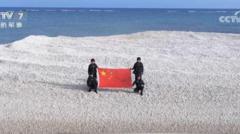The Chinese coastguard has taken control of a small sandbank in the South China Sea, according to state media, marking a new chapter in an ongoing dispute with the Philippines. CCTV displayed images of coastguard officers on Sandy Cay in the Spratly Islands, proclaiming that "maritime control and sovereign jurisdiction" was executed in early April. As the Philippine government has not officially responded, the situation remains fraught with tension as both nations continue to assert their claims.
Beijing Intensifies Territorial Dispute by Seizing Sandbank in South China Sea

Beijing Intensifies Territorial Dispute by Seizing Sandbank in South China Sea
China's coastguard has reportedly seized a sandbank, escalating tensions with the Philippines in a contested maritime area.
Sandy Cay is strategically located near Thitu Island, where the Philippines maintains a military presence to monitor Chinese activities in the contested waters. While reports suggest that no permanent occupation of the 200-square-meter sandbank has been established, the move has drawn significant attention. The US government has expressed concern, with National Security Council spokesperson James Hewitt warning that China's actions may threaten regional stability and violate international law.
This incident coincides with the annual Balikatan military exercises, involving 17,000 US and Philippine troops, which China has criticized as provocative. Despite tension, the Philippine military emphasizes that these drills are designed for national defense and not aimed at any specific country. The original territorial disputes in the South China Sea have seen increasing friction in recent years, particularly as China asserts its expansive claims through island construction and naval patrols, leading to confrontations with other claimants like Vietnam and Malaysia.
Amidst these dynamics, US support for its allies appears unwavering, with Defense Secretary Pete Hegseth affirming America's commitment to regional deterrence against China. The ongoing situation signifies a critical juncture in the South China Sea, where territorial claims and geopolitical tensions are more pronounced than ever.
This incident coincides with the annual Balikatan military exercises, involving 17,000 US and Philippine troops, which China has criticized as provocative. Despite tension, the Philippine military emphasizes that these drills are designed for national defense and not aimed at any specific country. The original territorial disputes in the South China Sea have seen increasing friction in recent years, particularly as China asserts its expansive claims through island construction and naval patrols, leading to confrontations with other claimants like Vietnam and Malaysia.
Amidst these dynamics, US support for its allies appears unwavering, with Defense Secretary Pete Hegseth affirming America's commitment to regional deterrence against China. The ongoing situation signifies a critical juncture in the South China Sea, where territorial claims and geopolitical tensions are more pronounced than ever.



















